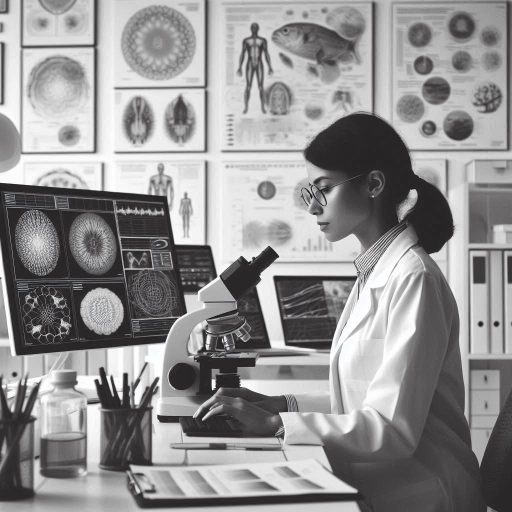Introduction
Bioinformatics is the application of computational tools to analyze biological data, particularly in the context of healthcare.
It integrates biology, computer science, and statistics to manage and interpret complex datasets.
This interdisciplinary field plays a crucial role in advancing medical research and patient care.
In modern healthcare, bioinformatics supports personalized medicine by analyzing genomic data.
It allows healthcare providers to tailor treatments based on individual genetic profiles.
By understanding how specific genes affect health, clinicians can offer targeted therapies that improve patient outcomes.
Bioinformatics also enhances disease diagnosis and prevention.
It enables researchers to identify biomarkers for diseases, leading to early detection and intervention.
By analyzing large datasets, bioinformatics helps uncover relationships between genetic variations and disease susceptibility.
Furthermore, bioinformatics aids in drug discovery and development.
It streamlines the identification of potential drug targets, reducing the time and cost of bringing new therapies to market.
This efficiency accelerates the availability of effective treatments for various conditions.
Bioinformatics plays a role in public health by tracking disease outbreaks and monitoring trends.
By analyzing genetic information from pathogens, healthcare professionals can respond quickly to emerging health threats.
Overall, bioinformatics significantly impacts modern healthcare, driving innovation and improving patient care.
Evolution of Bioinformatics in Healthcare
The History and Development of Bioinformatics in Healthcare
Bioinformatics has evolved significantly since its inception in the early 1970s.
Initially, it focused on storing and analyzing biological data using basic computational tools.
The first major breakthrough came with the development of the Human Genome Project in the late 1990s.
This initiative aimed to map the entire human genome, revolutionizing the field of genetics and genomics.
As technology advanced, bioinformatics began to incorporate more sophisticated algorithms and software.
These developments allowed for the efficient processing of large datasets generated by high-throughput sequencing technologies.
Bioinformatics has now become essential for analyzing genetic information and understanding diseases.
In the early 2000s, bioinformatics gained prominence in clinical settings.
Researchers used bioinformatics to identify genetic markers associated with diseases.
This application of bioinformatics led to personalized medicine, where treatments are tailored to individual genetic profiles.
Key Milestones in Bioinformatics
One significant milestone in bioinformatics was the creation of databases to store genetic information.
The GenBank database, launched in 1982, provided a centralized repository for nucleotide sequences.
This database facilitated data sharing and collaboration among researchers worldwide.
Another key advancement was the development of tools for analyzing protein structures.
In the late 1990s, the Protein Data Bank (PDB) became an invaluable resource for scientists studying protein function.
This resource allowed researchers to visualize protein structures and understand their roles in biological processes.
The introduction of next-generation sequencing (NGS) technologies marked another turning point for bioinformatics.
NGS dramatically reduced the cost and time required to sequence genomes.
Bioinformatics tools became essential for analyzing the massive amounts of data generated by these technologies.
In recent years, machine learning and artificial intelligence have transformed bioinformatics.
These technologies enable researchers to identify patterns in complex datasets.
They help predict disease outcomes and improve diagnostic accuracy.
The integration of AI into bioinformatics has opened new avenues for research and clinical applications.
Impact on Modern Healthcare
The impact of bioinformatics on modern healthcare is profound.
It has enabled the discovery of new biomarkers for diseases, leading to earlier diagnoses and better treatment options.
Personalized medicine, driven by bioinformatics, tailors therapies to individual patients based on their genetic makeup.
Bioinformatics also enhances drug discovery processes.
By analyzing genetic data, researchers can identify potential drug targets and predict drug responses.
This approach accelerates the development of new therapies and improves patient outcomes.
Moreover, bioinformatics plays a vital role in public health.
It helps monitor disease outbreaks and track the spread of infectious diseases.
By analyzing genomic data from pathogens, bioinformatics aids in understanding their evolution and resistance patterns.
Bioinformatics has a rich history and has undergone significant development in healthcare.
Key milestones, such as the Human Genome Project and advances in sequencing technologies, have shaped its evolution.
The integration of bioinformatics into modern healthcare has revolutionized diagnosis, treatment, and public health strategies.
As technology continues to advance, bioinformatics will remain at the forefront of innovations in healthcare.
Read: Challenges and Rewards: The Dual Life of an U.S. Environmental Scientist
Role of Bioinformatics in Disease Diagnosis
Analyzing Genetic Data for Disease Diagnosis
Bioinformatics plays a crucial role in analyzing genetic data for disease diagnosis.
It enables researchers to interpret vast amounts of genomic information.
This analysis allows clinicians to identify genetic mutations associated with specific diseases.
Through bioinformatics, doctors can assess a patient‘s genetic makeup.
They analyze sequences from DNA tests to identify abnormalities.
By comparing these sequences to known databases, healthcare professionals can pinpoint potential genetic disorders.
Moreover, bioinformatics helps in identifying biomarkers for diseases.
Biomarkers are indicators of a particular disease state.
By recognizing these biomarkers, clinicians can diagnose diseases earlier and tailor treatment plans effectively.
Examples of Diseases Impacted by Bioinformatics
Several diseases demonstrate the impact of bioinformatics on diagnosis.
Cancer is one of the most significant examples.
Researchers use bioinformatics to analyze tumor genomes, identifying mutations driving cancer development.
This information allows oncologists to create personalized treatment plans based on the specific genetic profile of the tumor.
Another example is cystic fibrosis.
Bioinformatics has improved the understanding of the CFTR gene, which causes cystic fibrosis when mutated.
Genetic testing can reveal specific mutations in this gene, guiding treatment options and interventions for affected individuals.
Cardiovascular diseases also benefit from bioinformatics.
Researchers analyze genetic data to identify risk factors associated with heart disease.
By understanding these genetic components, healthcare providers can recommend lifestyle changes and preventive measures tailored to individual patients.
Rare genetic disorders present another area where bioinformatics excels.
Often, these disorders result from specific genetic mutations that are challenging to diagnose.
Bioinformatics tools help researchers analyze family histories and genetic data to uncover the underlying causes.
This information can lead to accurate diagnoses and potential treatments.
Bioinformatics in Personalized Medicine
Bioinformatics significantly contributes to personalized medicine, tailoring treatment based on genetic information.
By understanding a patient‘s genetic makeup, healthcare providers can choose the most effective therapies.
This targeted approach increases the likelihood of successful outcomes and minimizes adverse effects.
For instance, in pharmacogenomics, bioinformatics analyzes how genes affect a person’s response to medications.
This analysis helps doctors select the right drugs and dosages for individual patients, optimizing treatment plans.
The impact of bioinformatics on modern healthcare is profound.
By analyzing genetic data, healthcare professionals can diagnose diseases with greater accuracy and speed.
Examples like cancer, cystic fibrosis, and cardiovascular diseases illustrate the transformative role of bioinformatics in diagnosis and treatment.
As bioinformatics continues to evolve, its applications in healthcare will expand.
The integration of genetic data analysis will drive advancements in personalized medicine, ultimately improving patient outcomes and quality of life.
Read: Job Market Trends: Future of Chemistry Jobs in America
Impact of Bioinformatics on Treatment Personalization
Tailoring Treatment Plans to Individual Patients
Bioinformatics enables the integration of genetic information into patient care.
By analyzing genomic data, healthcare professionals identify specific genetic markers associated with diseases.
This information helps them choose targeted therapies that are most likely to be effective.
For example, oncologists use bioinformatics to analyze the genetic profile of tumors.
They identify mutations that drive cancer growth.
Based on this analysis, they select targeted therapies that directly address these mutations.
Bioinformatics assists in understanding patient responses to medications.
Pharmacogenomics, a branch of bioinformatics, studies how genes affect drug metabolism.
This knowledge allows doctors to prescribe medications tailored to an individual’s genetic makeup.
Moreover, bioinformatics tools facilitate the analysis of large datasets.
Researchers can uncover patterns in patient data that inform treatment decisions.
This analysis helps identify which treatments yield the best outcomes for specific patient populations.
Bioinformatics also supports the monitoring of treatment efficacy over time.
By analyzing follow-up data, healthcare providers can adjust treatment plans as needed.
This flexibility ensures that patients receive the most effective care possible.
Personalized Medicine Revolutionizing Healthcare
Personalized medicine is revolutionizing healthcare through the integration of bioinformatics.
This approach focuses on tailoring medical treatment to the individual characteristics of each patient.
By leveraging bioinformatics, healthcare providers can create more effective treatment strategies.
Bioinformatics aids in the discovery of biomarkers for diseases.
These biomarkers help identify patients who are likely to benefit from specific therapies.
By using biomarkers, healthcare providers can avoid ineffective treatments and reduce adverse effects.
Furthermore, personalized medicine enhances disease prevention strategies.
Bioinformatics tools analyze genetic data to assess disease risk.
Patients identified as high-risk can receive targeted interventions, potentially preventing disease onset.
Bioinformatics also fosters collaboration among healthcare professionals.
By sharing genomic data, researchers can improve treatment outcomes across diverse patient populations.
This collaboration accelerates the discovery of new therapies and enhances healthcare delivery.
Bioinformatics supports the development of innovative therapies.
Researchers can analyze genomic data to identify novel drug targets.
This analysis facilitates the design of therapies that specifically target disease mechanisms.
Moreover, bioinformatics helps streamline clinical trials.
Researchers can identify suitable candidates based on their genetic profiles.
This targeted approach increases the likelihood of trial success and accelerates the development of new treatments.
Bioinformatics significantly impacts modern healthcare by personalizing treatment plans and revolutionizing healthcare delivery.
By analyzing genomic data, healthcare providers can tailor therapies to individual patients.
Personalized medicine, powered by bioinformatics, improves treatment effectiveness and patient outcomes.
As bioinformatics continues to advance, it will play an even more crucial role in healthcare.
This integration will enhance our understanding of diseases and foster the development of innovative therapies.
Ultimately, bioinformatics will reshape the future of medicine, making it more patient-centered and effective.
Read: Challenges and Rewards: Navigating the Chemist Career Path

Application of Bioinformatics in Drug Discovery
Bioinformatics in Identifying Drug Targets and Designing New Drugs
Bioinformatics significantly impacts modern healthcare by enhancing drug discovery processes.
It provides tools for analyzing biological data, leading to the identification of potential drug targets.
Researchers utilize bioinformatics to study the molecular mechanisms underlying diseases, pinpointing specific proteins or pathways for therapeutic intervention.
Through genomic and proteomic analysis, bioinformaticians can identify biomarkers associated with diseases.
These biomarkers serve as indicators for developing targeted therapies.
Understanding the biological context of these targets allows for more precise drug design.
Bioinformatics also streamlines the drug design process by enabling virtual screening of compound libraries.
Scientists use computational methods to predict how different molecules will interact with target proteins.
This approach saves time and resources by narrowing down potential candidates before laboratory testing.
Once promising drug candidates are identified, bioinformatics assists in optimizing their chemical structures.
Researchers can simulate how changes in molecular composition affect drug efficacy and safety.
This optimization process increases the likelihood of developing successful therapeutic agents.
Furthermore, bioinformatics plays a vital role in understanding drug resistance.
By analyzing genomic data from resistant strains, researchers can identify mutations that confer resistance.
This knowledge allows for the design of new drugs that circumvent these resistance mechanisms, improving treatment outcomes.
Efficiency and Cost-Effectiveness in Drug Discovery
Using bioinformatics in drug discovery enhances efficiency and reduces costs.
Traditional drug discovery methods can be time-consuming and expensive, often taking years to yield results.
Bioinformatics accelerates this process by providing powerful analytical tools for data interpretation.
The computational methods used in bioinformatics allow researchers to analyze vast datasets quickly.
This efficiency enables the identification of drug candidates that might otherwise go unnoticed.
By streamlining data analysis, bioinformatics shortens the time frame from discovery to development.
Moreover, bioinformatics minimizes the need for extensive laboratory testing during the initial stages of drug discovery.
Virtual screening of compounds significantly reduces the number of experiments required.
This reduction in laboratory work not only saves time but also decreases overall research costs.
In addition to saving time and money, bioinformatics enhances the success rate of drug discovery projects.
By focusing on well-characterized drug targets, researchers increase the likelihood of developing effective therapies.
This targeted approach reduces the risk of failure in later development stages, which can be costly.
Bioinformatics also enables better collaboration among researchers.
Sharing data and analytical tools fosters interdisciplinary partnerships, leading to innovative solutions.
Such collaboration enhances the overall drug discovery process, resulting in improved healthcare outcomes.
Bioinformatics plays a pivotal role in modern healthcare, particularly in drug discovery.
It facilitates the identification of drug targets and the design of new therapeutic agents.
By streamlining the drug discovery process, bioinformatics enhances efficiency and cost-effectiveness.
This technological advancement allows researchers to analyze large datasets quickly and accurately, minimizing the need for extensive laboratory work.
Ultimately, the integration of bioinformatics into drug discovery not only accelerates the development of new drugs but also contributes to better healthcare solutions.
As bioinformatics continues to evolve, its impact on drug discovery and patient care will only grow, paving the way for more targeted and effective treatments.
Read: Diverse Career Paths: From Chemist to Patent Attorney in the US
Bioinformatics in Precision Medicine
Bioinformatics in Precision Medicine and Targeted Therapies
Also, bioinformatics plays a crucial role in precision medicine.
This approach tailors treatments based on a patient‘s unique genetic makeup.
Researchers analyze genomic data to identify specific mutations associated with diseases.
Understanding these mutations allows healthcare providers to select the most effective treatments.
Targeted therapies aim to address the specific molecular mechanisms of diseases.
Bioinformatics tools help identify potential drug targets by analyzing genetic and protein data.
This identification enables the development of drugs that specifically attack cancer cells or other diseased tissues.
Moreover, bioinformatics supports clinical decision-making.
By integrating patient genomic data with clinical records, healthcare providers can make informed choices.
These data-driven decisions enhance treatment efficacy and minimize adverse effects.
Bioinformatics assists in biomarker discovery.
Biomarkers are biological indicators that help predict disease progression and treatment response.
By analyzing large datasets, bioinformaticians can identify novel biomarkers that guide therapy selection.
The use of bioinformatics in clinical trials also enhances drug development.
Researchers analyze genetic information from trial participants to optimize study designs.
This analysis helps ensure that the selected patient population responds well to the treatment being tested.
Transforming Healthcare Through Individual Genetic Variations
Bioinformatics is revolutionizing healthcare by focusing on individual genetic variations.
This focus allows for a deeper understanding of how genetics influence health.
Variations in DNA sequences can significantly impact disease susceptibility and drug metabolism.
By studying these genetic variations, healthcare providers can customize treatment plans.
This customization ensures that patients receive therapies tailored to their specific genetic profiles.
Such individualized approaches lead to improved treatment outcomes and increased patient satisfaction.
Furthermore, bioinformatics enables the integration of diverse data types.
Researchers can analyze genomic, transcriptomic, and proteomic data together.
This comprehensive analysis provides a holistic view of a patient‘s health status and disease mechanisms.
Bioinformatics also facilitates the identification of rare diseases.
By comparing genetic data from different patients, researchers can uncover genetic links to uncommon conditions.
This identification can lead to earlier diagnosis and more targeted interventions.
Bioinformatics enhances preventive healthcare strategies.
By analyzing genetic risk factors, healthcare providers can recommend personalized prevention plans.
These plans may include lifestyle changes or increased monitoring for certain conditions.
The shift towards genomics and bioinformatics in healthcare also fosters collaboration.
Healthcare professionals, researchers, and bioinformaticians work together to advance knowledge.
This collaboration accelerates the translation of research findings into clinical practice.
In essence, bioinformatics profoundly impacts modern healthcare by driving precision medicine and targeted therapies.
By focusing on individual genetic variations, bioinformatics enhances treatment strategies and patient outcomes.
The integration of genomic data into healthcare promotes a more personalized approach to medicine, improving both diagnosis and treatment.
As bioinformatics continues to evolve, it will play an increasingly vital role in transforming healthcare.
This transformation will lead to better management of diseases and improved quality of life for patients.
The future of healthcare relies on these innovative approaches to deliver effective and tailored care to every individual.
Explore Further: Key Challenges Facing Nanotechnologists Today
See Related Content: Understanding Geological Surveys and Their Importance
Challenges of Implementing Bioinformatics in Healthcare
Challenges in Implementing Bioinformatics in Healthcare Settings
The implementation of bioinformatics in healthcare settings presents several challenges.
First, integration with existing healthcare systems can be complex.
Many hospitals and clinics rely on legacy systems that may not support new bioinformatics technologies.
This incompatibility can lead to data silos, hindering the efficient use of genomic data.
Second, the shortage of skilled bioinformaticians poses a significant challenge.
Many healthcare organizations struggle to find professionals with the necessary expertise.
This shortage limits the ability to analyze genomic data effectively.
The lack of trained staff can slow down the adoption of bioinformatics technologies.
Moreover, funding for bioinformatics initiatives often falls short.
Many healthcare facilities operate on tight budgets, making it difficult to invest in new technologies.
Limited resources can hinder the development and implementation of bioinformatics tools.
As a result, healthcare providers may miss out on valuable insights from genomic data.
Data privacy and security also remain significant concerns.
With the rise of genomic data, safeguarding patient information is critical.
Healthcare organizations must comply with regulations like HIPAA while managing sensitive data.
Balancing data access with security measures can be a complex task.
Transform Your Career Today
Unlock a personalized career strategy that drives real results. Get tailored advice and a roadmap designed just for you.
Start NowLimitations of Bioinformatics Technology and Data Analysis
While bioinformatics offers numerous benefits, it also has limitations.
One major limitation is the quality of genomic data.
Incomplete or low-quality data can lead to inaccurate analyses and interpretations.
Bioinformaticians must constantly evaluate the reliability of the data they use.
Another limitation lies in the complexity of biological systems.
Biological interactions are often multifaceted and not fully understood.
This complexity makes it challenging to draw definitive conclusions from bioinformatics analyses.
Researchers must consider various factors when interpreting results, which can complicate decision-making.
Furthermore, existing bioinformatics tools may not be universally applicable.
Different diseases and conditions may require specialized tools for effective analysis.
The one-size-fits-all approach often falls short in addressing specific healthcare needs.
This limitation necessitates the development of tailored bioinformatics solutions.
The rapid pace of technological advancements can be overwhelming.
New algorithms and tools emerge frequently, creating a steep learning curve.
Healthcare professionals may struggle to keep up with these changes, affecting their ability to utilize bioinformatics effectively.
Finally, there is a gap between bioinformatics research and clinical application.
Many promising bioinformatics discoveries do not translate into practical healthcare solutions.
Bridging this gap requires collaboration between researchers and healthcare providers.
By working together, they can ensure that bioinformatics advancements benefit patients directly.
Implementing bioinformatics in healthcare settings faces numerous challenges.
These include integration issues, a shortage of skilled professionals, and funding limitations.
Additionally, the quality of data and the complexity of biological systems pose significant obstacles.
Understanding these limitations is crucial for maximizing the impact of bioinformatics on modern healthcare.
Despite these challenges, the potential benefits of bioinformatics in improving patient care and outcomes remain immense.
Addressing these hurdles can pave the way for a more integrated and effective healthcare system.
Future Prospects of Bioinformatics in Healthcare
Future Advancements in Bioinformatics and Healthcare
The field of bioinformatics continues to evolve rapidly.
Future advancements promise to revolutionize modern healthcare significantly.
One key area of growth is personalized medicine.
Bioinformatics enables healthcare professionals to tailor treatments based on individual genetic profiles.
This approach can lead to more effective therapies with fewer side effects.
Another exciting advancement involves the integration of artificial intelligence (AI).
AI algorithms can analyze vast datasets quickly and accurately.
This capability enhances disease prediction and diagnosis, leading to timely interventions.
For instance, AI can identify patterns in genomic data that may indicate potential health risks.
Wearable technology also plays a crucial role in the future of bioinformatics.
Devices that monitor vital signs in real time can provide valuable health data.
Bioinformaticians can analyze this data to track disease progression and treatment effectiveness.
This proactive approach allows for adjustments in care plans, improving patient outcomes.
Moreover, advancements in high-throughput sequencing will revolutionize diagnostics.
Techniques like whole-genome sequencing will become more accessible and affordable.
This accessibility will enable widespread genetic testing, facilitating early detection of diseases.
Early intervention can significantly enhance treatment success rates.
Shaping the Future of Medicine
Bioinformatics is expected to profoundly shape the future of medicine.
It will enhance our understanding of complex biological systems.
By integrating data from genomics, proteomics, and metabolomics, researchers can gain comprehensive insights into health and disease.
Furthermore, bioinformatics will drive the development of targeted therapies.
Understanding the molecular basis of diseases allows for the creation of drugs that specifically target disease pathways.
This precision medicine approach promises to increase treatment efficacy and minimize adverse effects.
Collaboration between disciplines will also strengthen bioinformatics’s impact on healthcare.
Partnerships between computer scientists, biologists, and clinicians will foster innovation.
Such interdisciplinary collaborations can lead to new research methodologies and improved patient care strategies.
Bioinformatics will play a crucial role in public health initiatives.
By analyzing population-level data, researchers can identify health trends and outbreaks.
This information helps public health officials make informed decisions about interventions and resource allocation.
The potential future advancements in bioinformatics will significantly impact modern healthcare.
Personalized medicine, AI integration, and wearable technology will drive these changes.
Bioinformatics will enhance disease understanding, facilitate targeted therapies, and promote interdisciplinary collaboration.
As the field continues to evolve, bioinformatics will reshape how we approach medicine.
The integration of vast datasets will lead to more informed healthcare decisions and improved patient outcomes.
By embracing these advancements, healthcare professionals can provide better care and drive innovation in the medical field.
The future of bioinformatics holds exciting possibilities for healthcare.
By staying informed and adaptable, researchers and clinicians can harness its power to improve lives.
This transformation will mark a new era in medicine, where data-driven insights guide patient care.
Conclusion
Bioinformatics significantly impacts modern healthcare by transforming how we understand and treat diseases.
It integrates biology, computer science, and data analysis to make sense of complex biological data.
Through bioinformatics, healthcare providers can develop personalized medicine, tailoring treatments to individual genetic profiles.
This approach enhances treatment efficacy and minimizes adverse effects.
In this blog post, we summarized the various ways bioinformatics influences healthcare.
It enables the identification of disease-causing mutations, guiding clinicians in diagnosing genetic disorders.
Bioinformatics also accelerates drug discovery, allowing researchers to analyze vast datasets efficiently.
This capability leads to faster development of new therapies and vaccines.
The importance of continued research and development in bioinformatics cannot be overstated.
As technology evolves, bioinformatics can drive innovations that enhance diagnostic accuracy and treatment options.
Investing in bioinformatics research will lead to breakthroughs in understanding complex diseases like cancer and diabetes.
Healthcare professionals, researchers, and policymakers must support bioinformatics initiatives.
By fostering collaboration among disciplines, we can unlock new possibilities in healthcare technologies.
Continued exploration of bioinformatics will ensure we meet the challenges of modern medicine.
Embracing this field will pave the way for improved patient outcomes and a healthier future for all.




